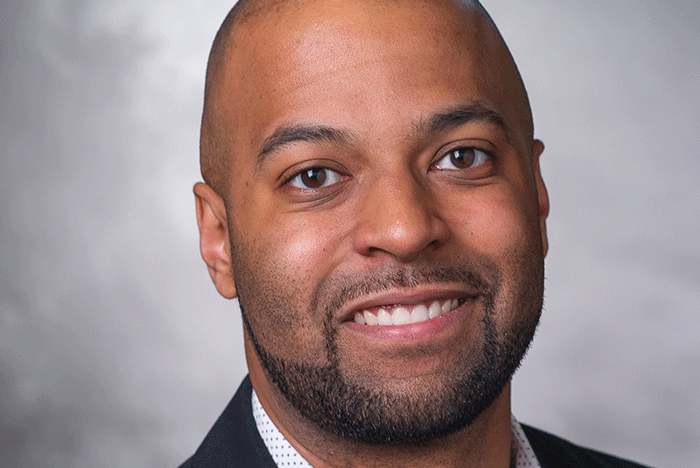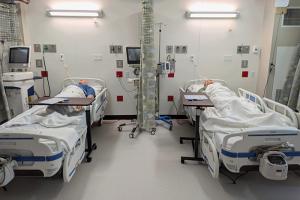Member makes his mark on local and national scale

The Ollie File
CV
- Manager, facilities operations, Advocate Condell Medical Center, Libertyville, Ill.
- Manager of energy solutions, Advocate Aurora Health, Chicago.
- Mid-level, energy efficiency engineer, DNV GL, Oakbrook Ill.
Accomplishments
- Chair, ASHE Operational Excellence Committee.
- President-elect, Healthcare Engineering Society of Northern Illinois.
- Professional Engineer.
- Certified Energy Manager.
- Certified Healthcare Facility Manager.
- Co-author, “Reducing Operational Costs Through Energy Efficiency” monograph.
- Recipient, ASHE 2018 Emerging Leader Award, Region 5.
Education
- Bachelor of Science in Mechanical Engineering, University of Michigan – Ann Arbor.
- Master of Energy Engineering, University of Illinois at Chicago.
Ryan Ollie, PE, CHFM, CEM, stepped into health care facilities management in 2015 and has steadily progressed with the help of mentors and professional membership groups. This month, he talks with HFM about his role at Advocate Aurora Health and how professional societies have impacted his career.
How did you get into the health care facilities management field?
Throughout my professional career, I have been very fortunate to have several wonderful mentors. Back in 2015, one of those mentors encouraged me to apply for an engineering job opportunity at Advocate Health Care, now known as Advocate Aurora Health.
Specifically, they were looking for someone to manage their utilities; develop/manage energy efficiency projects and initiatives; manage the mechanical, engineering and plumbing as well as the fire protection design standards; and oversee local, state and federal regulatory environmental requirements.
After interviewing with the administrator of facilities operations, I instantly bought into the culture of the organization and the mission of the in-house facilities, planning and design department. Fortunately, I was offered the position, and I became part of a phenomenal team.
How has your career progressed since joining Advocate Aurora Health?
Since joining Advocate Aurora Health, my career has been immensely enriched. As a mechanical and energy engineer, I was able to take a technical deep dive into some of the most complex building infrastructure and systems that I have ever encountered. While I brought a significant amount of knowledge from my previous work experience to the organization, this real-world education helped accelerate my technical development.
Furthermore, the organization’s emphasis on leadership development has also helped me hone my leadership skills and ultimately helped me land my current position as the manager of facilities operations at Advocate Condell Medical Center. Facilities managers interface in some fashion with almost every aspect of hospital operations. Therefore, soft skills such as interdepartmental collaboration and team member engagement are absolutely paramount to maintain smooth and effective operations.
What or who have been some of the biggest influences in your career?
All of my facilities directors and vice presidents have had a huge impact on my professional development in different ways. I have never worked with such a tight-knit group of leaders prior to joining the facilities department at Advocate Aurora Health.
Whenever one of us had a personal emergency, someone was always willing to step up, unprompted, and cover for their team member. It really does take a village to manage a multisite health system, and I have been fortunate to have wonderful, experienced leaders to lean on for support.
One specific influential moment occurred during a conversation with my former vice president, York Chan. I’m paraphrasing here, but during a one-on-one discussion, York told me that he was like a baseball manager in regard to his role within his team. Whenever we “hit home runs” and were in the spotlight, it ultimately cast him in a positive light, as well. In other words, he didn’t let his ego get in the way of empowering his team and letting them shine and flourish. After our meeting, I knew that I was working for a special person.
Are there any recent projects or initiatives you’ve embarked on?
We are right in the midst of a major med-surg and intensive care unit expansion project that commenced before the pandemic and will be completed in 2022. It’s a very challenging experience but also very exciting due to some of the innovative design elements that we are implementing.
Despite all of the obstacles with the pandemic, we have been able to retain most of the original scope of work and have even added some additional elements that will greatly enhance the quality of care for our patients and work environment for our caregivers. This multiphase project has definitely been keeping our facilities, design and construction teams extremely busy, and we can’t wait to see the finished product!
In what ways are you involved in your local American Society for Health Care Engineering (ASHE) chapter?
Currently, I sit on the board of the Healthcare Engineering Society of Northern Illinois. Being an active member of this organization has been an extremely rewarding experience, and I have made so many lasting connections.
In the midst of the pandemic, one of our biggest initiatives focused on maintaining a consistent stream of meaningful virtual educational offerings to our members to keep them engaged.
Now that our local and state governments are beginning to change regulations for group meetings, we are excited to begin offering more in-person events in a safe and thoughtful manner.
How did you get involved in ASHE’s Operational Excellence Committee, and what is its purpose?
In all honesty, York Chan strongly encouraged me to become active in ASHE. I started by co-authoring a monograph called “Reducing Operational Costs Through Energy Efficiency,” which was published in 2018, and eventually became involved with the Operational Excellence Committee.
Currently, the committee is focusing on developing three committee action plans (CAPs) that focus on reliability-centered maintenance, standardizing nomenclature for computerized maintenance management systems, and a pro bono technical verification program for qualifying ENERGY STAR® certification applicants.
Our committee hopes that these CAPs will benefit the membership by helping to remove some barriers and streamlining some key processes to ultimately help our members save valuable time and money.
What advice would you give to peers working to further their careers in this field?
Succession planning for the future is definitely a hot topic in our field, and it’s not going away anytime soon. Therefore, we’re always trying to keep a pipeline of talented people funneling through our organization so we’re not caught playing catch-up in the near future.
While there is not a single recipe for success, I would advise my peers to get involved in their local ASHE chapters and seek out mentorships from leaders who they can be open and honest with about their career aspirations.
Because professionals enter the health care facilities management field with varying degrees of knowledge, it’s extremely important to soak up as much information as possible from our field’s seasoned professionals before they retire.
Ultimately, we owe it to them to continue to carry the torch into the future by continuing to innovate and push the envelope in our field. At the same time, we also need to pay homage to all of the hard effort they’ve put in to draw positive attention to the important work that is being done.
I often joke with people on my team by comparing health care facilities professionals to the often polarizing superhero, Batman. We’re not always in the public eye and at the top of people’s minds, but we always show up when we are needed the most. Whether someone is shining the Bat Signal or entering a work order, we’ll always be there to assist our patients and co-workers to the best of our abilities.




